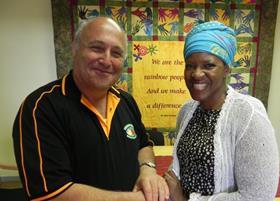
In 2008, the South African Sharon fruit industry decided to share a major part of its crop with the needy people of the country. Since then a substantial volume of fruit has been delivered every season to institutions caring for under-privileged and needy people in South Africa.
The first consignment of fruit in 2008 was handed over to Archbishop Emeritus Desmond Tutu at the Desmond Tutu HIV Foundation’s Emavundleni Centre for Vaccine Research in Guguletu near Cape Town.
In celebrating five years of giving, the next generation of the Tutu heritage, The Reverend Mpho Tutu, daughter of Archbishop Tutu and executive director of the Desmond and Leah Tutu Legacy Foundation, received another commitment from the industry for the new season which is due to start in April.
'As we move into a new generation of leadership we also move into a new opportunity to be a generation of generosity. The Sharon fruit industry is playing its part to cultivate a culture of sharing. They offer an example that we hope many will follow,' says Reverend Tutu.
Back in 2008 Archbishop Tutu described the event as 'an enormous and generous contribution which warms my heart'.
'This year the industry will expand its giving programme to include the Western Cape School Feeding Programme,' explains Meir Ben Artzy, CEO of Mor International, which launched the Sharon Fruit industry in South Africa more than 15 years ago. 'Not only does some of the Sharon fruit come from farms which include empowerment projects where workers have become co-owners, but the fruit also offers people who are sick and hungry the nourishment they so desperately need.
'We know that poor people are increasingly struggling to put food on the table,' he continues. 'The people who share this fruit with them are ordinary families from our country’s rural community who inspire all of us who believe in South Africa’s rainbow nation.'
Since the inception of the giving programme, the Sharon fruit growers and workers, through the central packing facility, Arisa, located at Swellendam, have donated several hundred tons of fruit each year to bone fide institutions during their season between May and the end of July.
When the programme started, Dr Linda-Gail Bekker, deputy director of the Foundation, said the fruit was very rich in sugar, vitamin B2 (riboflavin) and vitamin C.
'An improvement in nutrition of the malnourished may enhance immune function, prevent weight loss, particularly the loss of lean mass, and possibly delay disease progression in the HIV infected individual,' she noted. 'As such, the DTHF welcomes this opportunity to promote fruit as a healthy way for individuals living positively with the virus to give their bodies the best chance to fight the virus.'
South Africa’s Sharon fruit industry is relatively young, having been established during the past 15 years after the growing conditions in the Western and Southern Cape were identified as ideal for the production of the fruit.
The Cape region is only place in the Southern Hemisphere where Sharon Fruit is grown, and from here it is exported around the world to fill the gap in the market after the conclusion of the Northern Hemisphere season.
'Steady growth in production has meant that Sharon fruit is now freely available in South Africa during our season,' Ben Artzy, who is visiting South Africa to meet with growers and discuss plans for the coming local and international sales season,' explains.
'Our plans include a steady development of the South African market which will allow us to increase production and continue to provide more work opportunities on both the farms and in our packhouse,' he says. 'We are grateful for what has been achieved so far and giving something back to those who are struggling to make ends meet is important for us.'






No comments yet